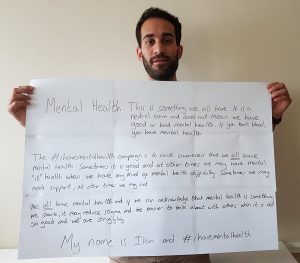Mental health makes you human, not unwell
On World Mental Health Day (October 10), Dr Ilan Ben-Zion, a Clinical Psychologist in London, blogs about the #ihavementalhealth awareness campaign he launched on the @NHS account earlier this year.
I’m not brave. I’m not speaking out. I’m just a human, talking about being human.
Having worked in mental health services for around 10 years, I am constantly surprised by how many people confuse the term ‘mental health’ with ‘mental health difficulties’. Countless people have told me that they don’t have mental health, because they think it means a mental health problem. However, having an arm doesn’t mean you have pain in your arm. Having mental health doesn’t mean you have a mental health difficulty.
First let’s get things straight. Mental health is something we *all* have. The term mental health is a neutral one. If someone tells you that they have mental health, they aren’t telling you anything about whether it’s good or not so good.

Now here is the issue. We all know there’s stigma around having mental health difficulties, so if people continue believing that mental health = mental health difficulties, it makes it very difficult for us to have any sort of conversation about mental health in the first place.
Let’s compare this to physical health for a moment. I’m sure you’d agree that we all have physical health. Maybe sometimes it’s good and other times it’s not so good, but either way, we all have it and we’re happy to acknowledge that. Most people are more than happy to tell you about their sprained ankle, are proud of the sling they wear, or crutches that support them. This might be because we all understand that we have physical health and that it changes at various points during the days, months and years of our lives. By acknowledging that we have an arm, it makes it easier to talk about when it’s in pain.
What many aren’t happy to tell you about are the ‘aches and pains’ they experience in their minds. This is because mental health is often misunderstood and not everyone appreciates that we all have it (whether good or not so good). Therefore, it’s not talked about as openly as physical health, and the stigma remains.
The #ihavementalhealth campaign aims to raise awareness that we all have mental health. Sometimes it is good and at other times it might not be. Sometimes we may need support, at other times we may not. If we can acknowledge that mental health is something everyone has, it may reduce stigma and be easier to talk about when it’s not so good and we’re struggling. It may also help us talk more openly about what we can do to look after and protect our mental health.
Therefore, as part of the campaign, I am asking you to spread this message by posting your name and #ihavementalhealth on social media (Facebook/Twitter/LinkedIn etc), with a picture of you if you can!
When starting this campaign, I was asked whether this is just about language, and getting people to use the right words. It’s more than that, it’s about people’s lives. It’s the ability to discuss your difficulties with others, to access support where needed and to provide it where someone else could benefit. Understanding that mental health is something we all share and is ok to talk about, can be the difference between isolation and comfort.
My name is Ilan and #ihavementalhealth. Follow Dr Ilan Ben-Zion on Twitter.
